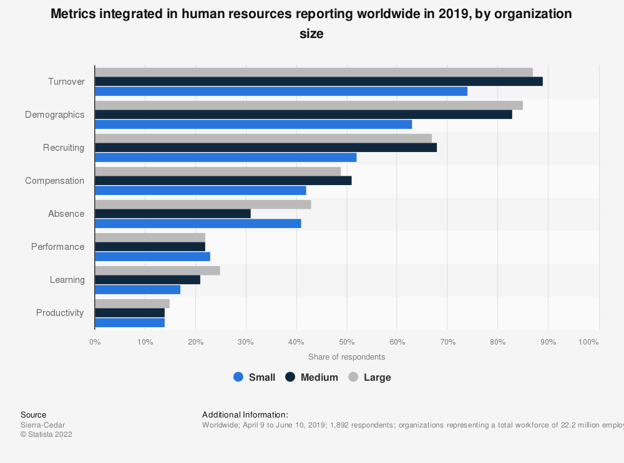7 reasons why you need to invest in HR reporting and analytics
By Tara Clarke in HR Transformation
The COVID-19 pandemic forced many businesses to speed up how they manage HR functions and operate online. Organisations needed to create a way of getting robust information and data on recruitment, staff productivity, learning, and well-being.
High-quality HR information is the bedrock of any high-performing company. When data is inaccurate, it can harm performance across your entire organisation and affect your decision-making.
Strategic thinking and decision-making need strategic metrics.
HR digital transformation tools give businesses powerful and actionable insights that can be extracted and reported on. It’s why 60% of HR departments are expected to invest in predictive analytic solutions over the next few years. What’s more, Statista reports that startup businesses are expected to double their share of the HR technology market by 2025, investing in HR software solutions a priority for most businesses.
This article will highlight the differences between HR reporting and analytics. Find out seven proven reasons why you should invest in a top-notch HR software solution for your business.
What is HR reporting?
HR reporting is the process of tracking key performance indicators (KPIs) about your workforce, through HR reporting tools. According to Zippia an overwhelming majority of businesses (97%) plan to increase their investments in HR reporting tools.
Utilising the HR reporting functions, Western Global was able to make sure that key managers stay updated when it comes to people management. They wanted a HR reporting solution that:
- Includes a performance management tool that aligns staff with company objectives
- Improves their onboarding process using an online onboarding portal
- Creates more meaningful HR reports that keep the C-Suite in the loop.
And the result? Appogee HR provided an efficient solution for Western Global to operate seamlessly throughout the pandemic. All employees within the company could access leave requests, company documents, and all of the critical reporting functions online.
Similarly, by using newly available leave profiles, they were able to keep track of who was working from home, the office, and those who furloughed. The reporting functions gave senior managers an instant overview–helping them make better staffing decisions.
Bespoke HR reporting solutions, like Appogee HR Success, will give a better understanding of the important metrics you want to track. It can influence decision-making across the whole of your business by:
- Filtering data by preference. Report on an individual, team, or whole organisational employee costs, and leave.
- Helping you achieve business goals and targets. Identify areas for improvement quickly and enable you to allocate extra resources when needed.
- Identify what areas of your business are going well. Notice when aspects of your business aren’t achieving what you’d expected. The ability to notice those areas that are thriving allows you to celebrate success.
How is HR analytics different from HR data?
HR analytics is a decision-making tool. It gives organisations key metrics by collecting and analysing HR data, with the ultimate goal of improving workforce performance.

Source: Statista
HR analytics help leaders and managers work out whether their plans are working or not and it's HR managers that are usually the first to spot and take action on the issues faced by their organisation.
For example, understanding your first-year turnover rate combined with employees who left the organization within one year and the total number of new hires will show whether more of your profits are needed in employee retention.
Even more, some 26% of businesses surveyed by Deloitte report ineffective recruiting technology as their toughest recruitment challenge. HR analytics assist with improving the quality of new hires and decreasing the time it takes to onboard new employees.
Develop talent pipelines by future-proofing recruitment processes. Screen candidates easily with information about skills and qualifications at the touch of a button. It’ll help identify talent earlier by developing good relationships with new hires and existing employees.
HR analytics gives powerful insights you need at the time you need them.
The top seven reasons to invest in an HR software solution
Get rid of paper-based systems and the filing cabinet. HR digitalisation tools offer functionality, efficiency, and access to real-time data and insights. Here are seven reasons why a HR reporting and analytics tool can propel your business forward.
1. Increase diversity
Employees want to feel confident being themselves at work, valued for their contributions, and feel supported to be productive in a way that is right for them and the organisation. It’s not a one-size fits all approach.
Some 56% of businesses stated that they have updated their policies to appeal to a multigenerational workforce. Having accurate diversity data can certainly boost a company’s reputation.
HR reporting software can support your diversity, equality, inclusion, and belonging (DEI&B) strategy and break down obstacles, for example:
- Eliminating age discrimination. Ageism is one of the most common forms of discrimination in the workplace. Removing unconscious bias from the recruiting and interviewing process so top talent is onboarded with anonymised processes.
- Combatting the stigma associated with mental health. Promoting the best mental health approaches is a strategic priority. Broadcast job advertisements to a range of social networks that go beyond your usual platforms. Diverse candidate sourcing broadens horizons to find niche talent pockets, regardless of someone’s mental health condition.
- Preventing barriers for immigrants. Skilled immigrants face many challenges when it comes to happiness at work, hampering their sense of belonging at the company. HR transformation tools improve workplace culture by monitoring how employees have completed diversity training or capturing and analysing the voice of employees.
- Fostering a culture of continuous improvement. HR reporting and analytics can give you detailed employee data on staff learning and development. Employees receive reminders when training is overdue. HR digital tools offer a complete overview of employee development and help identify any gaps, such as new hires accessing inclusive language training.
2. Assets due for return or replacement
With the increase in remote and hybrid working environments, many employers provide assets to use for their employees.
Laptops, mobile devices, and even bicycles are given to assist employees to carry out their roles. Some are used for both personal and professional use.
HR reporting and analytics tools help monitor which assets have been allocated to individual employees. When an employee fails to return company property, you can contact the employee and attempt to get them to agree to return the property, setting out the possible consequences of a failure to do so.
Equally, find out which assets are due for replacement or upgrade. Set timescales for improving the latest technology. Assist all employees to carry out their job with the very latest equipment and software.
3. Monitor training and certification expiration dates
A staggering 82% of L&D managers say that reporting analytics is one of the most important features of an HR function.
Organisations that employ staff who must demonstrate qualifications in first aid, safeguarding, or teaching need to understand when certification expires. HR software helps plan and take corrective measures to make sure employees meet statutory requirements.
HR software solutions offer accurate methods of monitoring employee training and development along with reminders when certification expires.
Evaluate training and development outcomes by reporting on engagement and impact.
Given the fact that freelance and contract workers are essential, monitoring contractors and freelancers by knowing contracts are coming to an end. Plan ahead.
4. Carry out timely performance reviews
HR reporting tools provide data about employee engagement and performance.
“I chose to invest in an HR software solution because I was looking for a new way to improve my business.” Krittin Kalra explains. “When I started using the software, it helped me improve my business by providing me with a better understanding of my employees. I was able to identify the top performers, and I was able to make better decisions about how to allocate my time and resources.”
Employee time tracking provides data you can use for giving feedback, as well as safeguarding employees against harmful working practices, such as exceeding working hours or not taking their quota of annual leave.
Run employee reports that show performance-related insights. Have data to hand for onward discussion and make performance review meetings productive.
5. Monitor employee absence
Managers should be able to access data directly and review it interactively. A HR software solution will provide information in real-time to understand and take necessary action without delay.
- “The HR team had next to no visibility on the absences of our employees, which made it very difficult to run payroll and manage leavers. This in turn led to policy breaches and varied data stores and ways of tracking leave and sickness” –Chris Poole, Group Digital Workplace Manager at FirstGroup PLC
HR data and analytics tools show employee data in one place. Staff can easily request leave, and log sickness, and working hours. Managers can approve leave with a few clicks, see when other team members are off, and put plans in place to cover any gaps in provision.
6. Comply with employment laws and regulations
Businesses must have policies and procedures that align with current laws and regulations. Still, many organisations find dealing with new government regulations challenging. Updates with employment law can be hard to keep abreast of and implement.
Investing in HR reporting and analytics solutions helps make sure your organisation remains compliant with:
- Employment Rights Act 1996
- GDPR (General Data Protection Regulation)
- Equality Act 2010
- National Minimum Wage Act (1998)
- Agency Workers Regulations (2010)
- Employment Relations Act (1999)
- Data Protection Act 2018
Digital transformation tools support HR functions to conform with legal requirements and are trusted by organisations worldwide to simplify processes.
7. Maintain accurate employee profile data
According to Fortunly 13% of small businesses collapse because they lose focus and are unable to adapt to change. When information is wrong, we make wrong business decisions.
Incorrect employee information creates an environment where workers are cynical and mistrusting of their employer–resulting in situations where employees question their employer’s every move. A study by Qualtrics found that engaged employees see a 10% increase in customer ratings and a 20% increase in closing more deals.
As well as the standard employee profile data such as a home address, national insurance number, or salary scale, Appogee HR reporting allows you to maintain and analyse other critical employee profile data with one simple secure dashboard. For example:
- Employee retirement rates
- Average length of service
- Average age of employees
- Employee satisfaction rates
HR reporting and analytics technology allow you to maintain accurate staff records and set reminders to review employee personal details periodically.
Are you ready to step up your HR reporting and analytics solution?
An HR cloud-based technology solution offers a wide range of benefits. It provides robust information on demand, securely and efficiently.
The right HR software will provide the right data at the right time. After all, data leads to insights and those insights lead to taking the right action.
Appogee HR Success can provide you with a first-class HR reporting and analytics solution. Use data to identify patterns and trends, and take your business to the next level.
Try Appogee HR free for 14 days or book a demo with a member of our friendly team and learn more about our packages.
.webp?height=168&name=appogeehr%20(1).webp)



-1.png?width=620&height=372&name=Copy%20of%20HR%20in%202022%20-%20Slides%20(3)-1.png)
